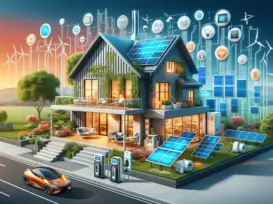Grus Home Energy - Home Battery Storage
Maximizing Energy Independence: The Rise of Home Battery Storage Solutions
Maximizing Energy Independence: The Rise of Home Battery Storage Solutions
The quest for energy independence and sustainability has led to the rise of home battery storage systems as a critical element in modern residential energy solutions. These systems, which were once a niche product for the environmentally conscious or tech-savvy homeowner, have now become mainstream, thanks to technological advancements, cost reductions, and a growing awareness of environmental issues.
Home battery storage systems work by storing electricity either from the grid during off-peak hours, when it is cheaper, or from renewable energy sources such as solar panels. The stored energy can then be used during peak hours, when electricity is more expensive or during power outages, providing homeowners with uninterrupted power supply and potential cost savings.
One of the most significant benefits of home battery storage is its ability to enhance the efficiency of renewable energy systems. Solar panels, for example, generate electricity during the day when many homeowners are not home to use it. Without storage, this excess energy would be sent back to the grid, often at a lower rate than what the homeowner would pay to buy it back during peak hours. By storing this energy, homeowners can use it when they need it, maximizing their use of renewable energy and reducing their reliance on the grid.
Moreover, home battery storage systems are integral to the concept of the ‘smart home’. They can be integrated with home energy management systems, allowing homeowners to control and optimize their energy usage. Homeowners can program their battery systems to charge during times when electricity rates are lower and discharge during periods of high demand or when rates are high. This level of control can result in significant cost savings and increase the overall efficiency of the home’s energy consumption.
Energy security is another critical factor driving the adoption of home battery storage. In areas prone to natural disasters or where power outages are common, having a battery storage system means that households can maintain power for essential appliances and systems such as refrigerators, lighting, and medical devices. This resiliency is invaluable for homeowners who want to ensure that they have a reliable power supply in any circumstance.
The environmental impact of home battery storage cannot be overstated. By promoting the use of renewable energy and reducing the need for fossil fuel-based power generation during peak demand, these systems help to lower carbon emissions and contribute to the fight against climate change. As battery technology continues to improve, we can expect even better performance, longevity, and environmental benefits.
Despite the many advantages, there are challenges to widespread adoption of home battery storage. The initial cost of purchasing and installing a battery can be high, although prices have been falling and are expected to continue to do so. There is also the matter of ensuring that batteries are recycled at the end of their life to mitigate the environmental impact of their disposal.
In conclusion, home battery storage systems represent a pivotal step toward the future of residential energy consumption. They offer homeowners the opportunity to take control of their energy use, save money, and support the growth of renewable energy. As the technology becomes more accessible and cost-effective, we can expect to see more homes around the world harnessing the power of battery storage, leading us toward a more sustainable and energy-independent future.
Blog, Smart Home Automation , February 17, 2024 , Electric Vehicle (EV) Charging, Energy Consumption Analysis, Energy Management, Energy Savings and Profit, Heat Pumps Optimization, Home Battery Storage, Renewable Energy Technologies, Smart Grid Technology, Smart Metering, Smart Metering Systems, Solar Panels Efficiency, Sustainability in Home Energy
©2025 All Rights Reserved. Grus IoT Co.,Ltd.
